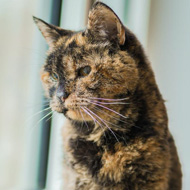
Flossie is a few weeks short of turning 27.
A London-based cat has been named the world's oldest cat living by GUINNESS WORLD RECORDS.
Flossie, who turns 27 in only a few weeks, has had a busy life, coming into the care of Cats Protection earlier this year.
After being rescued from Merseyside as a stray, Flossie lived with her original owner for 10 years. Sadly, her owner passed away, and her owner's sister took Flossie in.
Her new owner passed away after 14 years together, and Flossie then lived with her son for three years, but his situation meant that he had to sign Flossie over to Cats Protection.
Cats Protection has helped Flossie to find a new home with Vicki Green, a fellow 27-year-old from Orpington with experience caring for elderly cats.
Vickie commented on Flossie's new title: “I knew from the start that Flossie was a special cat, but I didn’t imagine I’d be sharing my home with a Guinness World Records title holder.
“She’s so affectionate, playful and sweet, especially when you remember how old she is. I’m immensely proud that Cats Protection matched me with such an amazing cat.
“She’s deaf and has failing eyesight but none of that seems to bother her. She’s completely with it, loves affection and has a very good appetite. She never turns her nose up at the chance of a good meal, except when she’s snuggled on her favourite yellow blanket.”
Editor in chief at GUINNESS WORLD RECORDS, Craig Glenday, commented: “We were so excited to hear about the lovely Flossie and celebrate her long life - it’s not every day you come across a cat who has been around since the mid-nineties.
“This is the human equivalent of over 120 years old, which would put her on par with Jeanne Calment, the French supercentenarian who lived to 122 years 164 days and holds the record for the oldest person ever.
“We're happy to see Flossie settled and enjoying all the home comforts she deserves in her later life. A huge congratulations to Flossie, a highly deserving record-breaker.”
Image (C) Cats Protection/Guinness World Records



 The veterinary mental health charity Vetlife is inviting the veterinary community to join it for a sponsored cold-water dip.
The veterinary mental health charity Vetlife is inviting the veterinary community to join it for a sponsored cold-water dip.